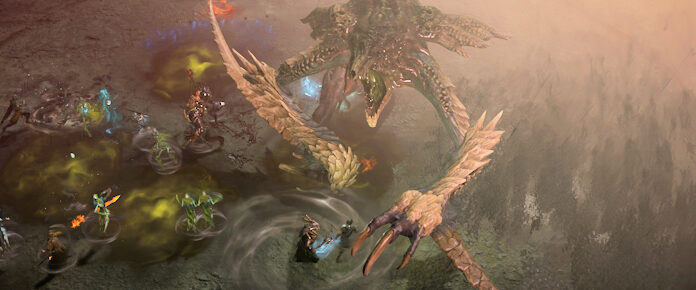
It’s been a busy couple of months for Pearl Abyss and Kakao games. While Black Desert players knew about Pearl Abyss taking up self publishing duties for the game’s western PC release a whole year before the announcement, news of the split became official in December. Fast forward to today, and Black Desert is now fully self published by Pearl Abyss out here in the west – on all platforms.
There have been a few ups and downs with the transferring of accounts, but things seem to be looking up for Black Desert. The PC version’s newfound independence will (hopefully) help PA make more informed and direct decisions around nerfs, buffs, and whatever the game will need to stay relevant. I’m very optimistic about it.
But… what exactly was and is Kakao? What is it known for? We’re going to do something a little different for this edition of Desert Oasis. Kakao has played a major role in Black Desert Online’s growth to date, and I’d be remiss to not at least talk about the company’s history, growth, KakaoTalk, and involvement in game publishing.
Kakao is damn near everywhere
I never really thought too hard about Kakao’s existence. To me, the only reason it was relevant was that it published BDO in the west… at least until my wife casually told me to download KakaoTalk on my phone before our originally planned trip to Korea a year ago. (Unfortunately, that got cancelled thanks to the pandemic.) But that was when I found out that it’s probably easier to ask what Kakao doesn’t do. Taxi? KakaoTaxi. Music? KakaoMusic. Banking? KakaoBank. Messaging? KakaoTalk. Fashion? KakaoStyle The list goes on. And all this stems from the flagship app, KakaoTalk. It’s also got its own super-cute emotes known as Kakao Friends.
It’s no wonder I needed the app to get around in South Korea. It’s such a powerful presence in the region. Some may think that its reach is limited to just South Korea, but that’s not true. For K-Pop fans, it’s the go-to company for licensing out music for popular apps like Spotify. As of this article’s publication, Kakao and Spotify are in the middle of a licensing kurfuffle, and many songs owned by Kakao M are actually getting removed from Spotify. It’s almost weird how the same company that was involved with Black Desert Online also has its hands into other ventures such as music. It’s a powerhouse of a company, and it’s only about 10 years old.
But Kakao didn’t just come out of nowhere; its formation was a result of few mergers from some of Korea’s largest companies.
Digging into the history books
The company started in 2010. But we’re not going to start there. To understand how Kakao actually became what it is today, we need to look at three companies: Daum, Hangame, and Navar.
Lets go back to 1995, when a small South Korean company named Daum started. With services like Google and Amazon playing major roles in the lives of many westerners, it’s easy to forget that they’re not the only company that provides internet services such as email, messaging, message boards, and shopping. Daum provided all of that for South Korea and soon became the largest web portal. As early as 2004, this company had interest in the mobile market; that’s why it bought Lycos back in 2004. (Ask your parents, kids.)
In 1999, two tech companies emerged during the SK internet boom: Hangame and Naver. As the name implies, Hangame was (and still is) a gaming company focused on a variety of genres. Meanwhile, Naver featured a powerful search engine still used in Korea today. Shortly after their birth, they merged in 2001, creating the NHN corporation. Together they made a profitable company in both the gaming sphere and internet. The corporation split back into its original brands in 2013, and both are still major players in their respective wheelhouses.
But what does this have to do with Kakao? The talent. Specifically Hangame’s founder, Kim Beom-soo. Kakao Inc, as it was formally known, was founded by Kim Beom-soo in 2010. Kim was a CEO at the NHN corporation and saw a need: a chat app for the budding mobile phone market. Its main focus was on a little app called KakaoTalk. It’s basically a chat app in the same vein as WeChat. Today, it’s a popular app used by millions, but at the time it was a huge risk, and some people thought it was a bad idea.
That quickly proved the opposite as KakaoTalk exploded in popularity and is now the go-to messenger app in South Korea. Today, it’s not just a messager app; it’s everything from a social media platform to a gaming service.
And with this momentum behind it, the company decided to try its hand at video game publishing.
Pearl Abyss and Daum
Enter Pearl Abyss. Remember NHN Corporation? Well, it turns out the company had some very talented game developers, particularly Kim Dae-Jin. Ever heard of Continent of the Ninth Seal (C9)? He worked on the game. Often cited as a progenitor to Black Desert Online, C9 did well enough, but Kim had set his sights on something higher. So in 2010, he left the company to form Pearl Abyss and started development on Black Desert.
Pearl Abyss and Kakao were founded around the same time, so as MOP readers will recall, it was Daum subsidiary Daum Games, the company that started in 1995, that actually took on initial publishing rights for Black Desert Online. If you look back far enough, you’ll see that old forum posts (and our articles) about BDO mention Daum instead of Kakao. And it’s because Daum got to it first, until 2014, when Kakao and Daum communications merged. The merge was a massive success. The combined companies actually started to threaten Naver’s dominance in the South Korean internet market. Eventually, Daum Games was renamed to Kakao Games. And that’s how Kakao eventually attached its name to Black Desert Online.
While most westerners know Kakao for publishing BDO, it’s also responsible for publishing Path of Exile and Playerunknown’s Battlegrounds in South Korea. It’ll be an even bigger name here in the near future since it’s publishing Elyon as well, and just this week, the company announced a new survival sandbox, Dysterra. So it’s got a pretty strong presence for those in the gaming scene, even without Black Desert Online. I look forward to seeing what both companies have in store for the genre in the next 10 years. Keep your eyes on them: I got a good feeling about this.
Overall, I think the shift back to Pearl Abyss was a good move. Pearl Abyss is a dedicated gaming company, while Kakao is a little bit of everything. But whether players saw Kakao’s involvement as good or bad, it’s still a part of BDO’s history.
 The Great Valencian Black Desert is a dangerous place, but thankfully there’s always a chance for respite. Join Massively OP’s Carlo Lacsina every other week for just that in Desert Oasis, our Black Desert column! Got questions or comments? Send him a message or drop by his Twitch channel to hang out while he’s streaming the game!
The Great Valencian Black Desert is a dangerous place, but thankfully there’s always a chance for respite. Join Massively OP’s Carlo Lacsina every other week for just that in Desert Oasis, our Black Desert column! Got questions or comments? Send him a message or drop by his Twitch channel to hang out while he’s streaming the game!

















